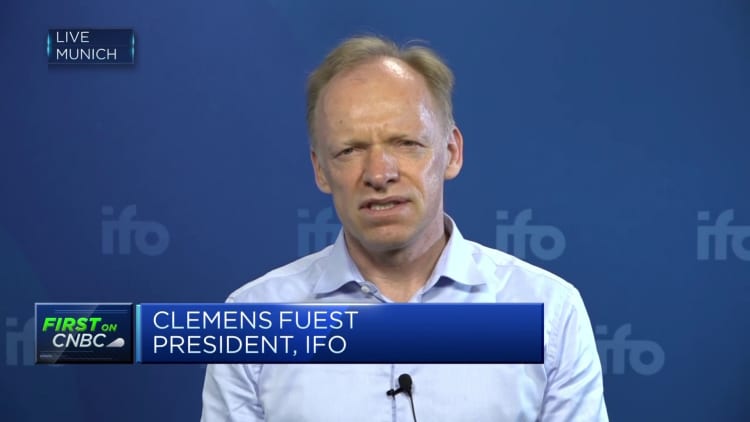Germany has been slowly regaining the unenviable title of "the sick man of Europe" in recent weeks, although some economists aren't convinced it's a fair and accurate description of Europe's largest economy.
Germany was first described with that moniker in 1998 as the country navigated the costly challenges of a post-reunification economy. Fast forward to today and the International Monetary Fund forecasts the German economy will shrink in 2023, which would make it the only G7 economy to officially contract this year — prompting the nickname to creep up once again in various media outlets.
But does Europe's biggest economy deserve the title?
"To call an economy with record employment, a lot of job vacancies and the best physical position of almost all major economies in the world 'the sick man of Europe' really does not fit," Holger Schmieding, chief economist at Berenberg Economics, told CNBC last week.
"They have definitely not gone wrong to such an extent that that label would be adequate," Schmieding added.
While Germany fell into recession in the first quarter of 2023, there are "major differences" between the country now and its last stint as Europe's "sick man," according to Jasmin Groeschl, senior economist for Europe at Allianz, including pressures from external geopolitical challenges and a global economic slowdown.
The issues weighing on Germany's economy can be separated into "two very separate battles," Stefan Kooths, research director for business cycles and growth at the Kiel Institute for World Economy, told CNBC.
There are short-term, cyclical issues, many of which are a result of the global economic climate, paired with longer-term, structural problems that stem from Germany itself, he said.
Short-term cyclical issues
One big difference between Germany's economy now and its situation in the 1990s and early 2000s is the cyclical headwinds it's currently tackling, according to Carsten Brzeski, global head of macro research and chief euro zone economist at ING Research.
China's Covid-19 reopening earlier this year didn't create the bounce back many were hoping for, which is hitting manufacturing countries across the world, while higher interest rates and energy prices are also having an effect.
"It is a different sickness [compared to] 20 years ago," Brzeski told CNBC.
Germany's exports, for example, are predominantly in sectors which rise and fall with the wider economy, such as cars, machinery, tools and chemicals, while other countries, such as France, are much more dependent on services exports, which are thriving in a post-pandemic world.

"Germany is struggling because the export machine is stumbling," Groeschl said.
For the first time in decades Germany reported a foreign trade deficit of 1 billion euros ($1.03 billion) for May 2022, marking a shift from its trade surplus to importing more than it exports.
While Germany has since returned to a trade surplus, totaling 18.7 billion euros in June, according to the federal statistics office, exports are still sluggish. The value of goods exported to other countries in June increased just 0.1% on the previous month, and was down 1.9% compared to June 2022.
Exports to China decreased by 5.9% to 8.2 billion euros in June month-on-month, according to data from the German federal statistics office.
Long-term structural issues
Working alongside those cyclical headwinds are longer-term, structural problems in the German economy that need to be resolved in order for the country to get rid of its "sick man" image, according to economists who spoke to CNBC.
"Germany needs lower corporate taxes, less red tape, faster approval procedures, more investment in roads, bridges and digital infrastructure, competitive electricity prices and better schools," Joerg Kraemer, chief economist at Commerzbank, told CNBC via email.

"There is no credible comprehensive reform package to address the underlying causes of Germany's economic underperformance," he added.
A government spokesperson declined to respond to the comments made in this article when contacted by CNBC.
Pension problems
The number of hours worked in Germany has been in decline since 1991, and the Kiel Institute forecasts they will continue to drop next year, also weighing on the country's growth potential, Kooths said.
"What makes the problem a real problem is that we have a legacy which consists in the growing number of people that have to be supported by … the pension system."
Germany has the largest aging population in Europe, with a growing percentage of Germans in retirement, putting strain on an already buckling pension system.
"Reform which means an increase of the retirement age is necessary," Kooths said. "This is really a problem that currently isn't addressed, but which should be addressed — the sooner the better," he added.
Energy obstacles
Like most of Europe, Germany's energy prices have been volatile following Russia's full-scale invasion of Ukraine. But energy is also a longer-term issue for the country as it tries to implement its Energy Efficiency Strategy 2050, which includes slashing its primary energy use by 2030.

But the move toward more sustainable energy generation is not necessarily a one-way, or cheap, journey. For example Germany closed its last three nuclear power plants in April, as the country looks to minimize the risk of nuclear accidents, but many climate scientists saw the move as a step in the wrong direction.
Meanwhile, there are fears that high energy costs are prompting German companies to consider leaving the country altogether.
"Many Germany-headquartered businesses are doing well globally, but they are struggling with operations in their own country," Siegfried Russwurm, head of the German Industry Federation, told CNBC in June.
Germany is 'average'
With so many factors contributing to Germany's "sick man" reputation, the country may struggle to shake off the image for some time.
"Germany ... is no longer top of the pile in terms of the European growth rate, it is no longer the powerhouse. It's average," Schmieding said.
Brzeski said he believed Germany is the sick man of Europe, but he added that "it is a couple of sicknesses that clearly have also hit other European economies. So it is not that this is an isolated case."
"[Germany] is probably only the most prominent and the most exposed one," Brzeski said.


